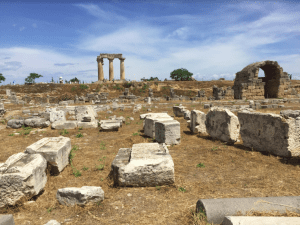It’s Lent so it’s a good time to repent, to turn from our sins and to receive the grace of God’s transformative forgiveness. It’s also a good time to turn to 1 Clement’s call to repentance, which means a good time to see the examples of good behavior in the Bible’s story (according to Clement of Rome). What is his focus in their good examples? Read further.
 Our series on the Friday With Our Fathers (FWOF), using Michael Holmes, The Apostolic Fathers.
Our series on the Friday With Our Fathers (FWOF), using Michael Holmes, The Apostolic Fathers.
1 Clement 9:1–12:8.
The issue, to recall, is schisms and envious battlings in the church at Corinth. The solution is to repent and (for today) to remember the good examples.
Therefore let us be obedient to his magnificent and glorious will, and presenting ourselves as suppliants of his mercy and goodness, let us fall down before him and return to his compassion, laying aside the fruitless toil and the strife and the jealousy that leads to death (9:1).
Repent by becoming obedient and then turning to good examples.
Let us fix our eyes on those who perfectly served his magnificent glory (9:2).
Who are the examples? Enoch, Noah (who “proclaimed a second birth to the world by his ministry”), Abraham. Notice how Abraham is understood, in a James way: “as found faithful when he became obedient to the words of God” (10:1). The Pauline favorite — “faith/faithful” — is comprehended here as obedience. The singular act of obedience in mind is leaving Ur for the land God promised in Genesis 12.
Because of his faith and hospitality a son was given to him in his old age, and for the sake of obedience he offered him as a sacrifice to God on one of the mountains that he showed him (10:7).
Next he turns to Lot, who is praised because of his “hospitality and godliness” (Abraham had the first and “faith”)(11:1). Notice, too, how he describes Lot’s wife in terms that evoke schism in Corinth: “for after leaving with him she changed her mind and was no longer in harmony [homonoia]” (11:2). This is a warning to the “double-minded” [hoi dipsuchoi, a term from James; 1 Clem 11:2].
Then Rahab (12:1-8, 8 verses on Rahab as a moral example). She is praised for “faith and hospitality” (like Abraham). Her scarlet hanging is understood to be the blood of Christ (12:7). Which proves that not only is there faith in Rahab but also “prophecy” (12:8).
What comes off as central to life of faith, the kind of faith that ends schisms and envious battlings? Hospitality. (See Joshua Jipp, Saved By Faith and Hospitality.)













